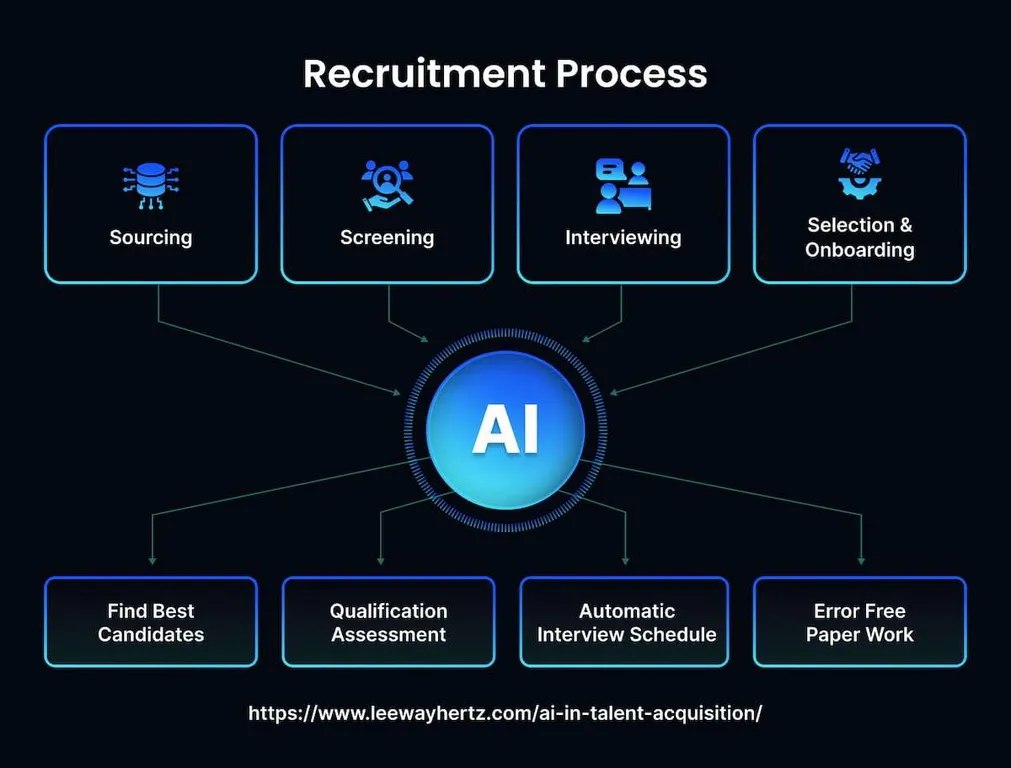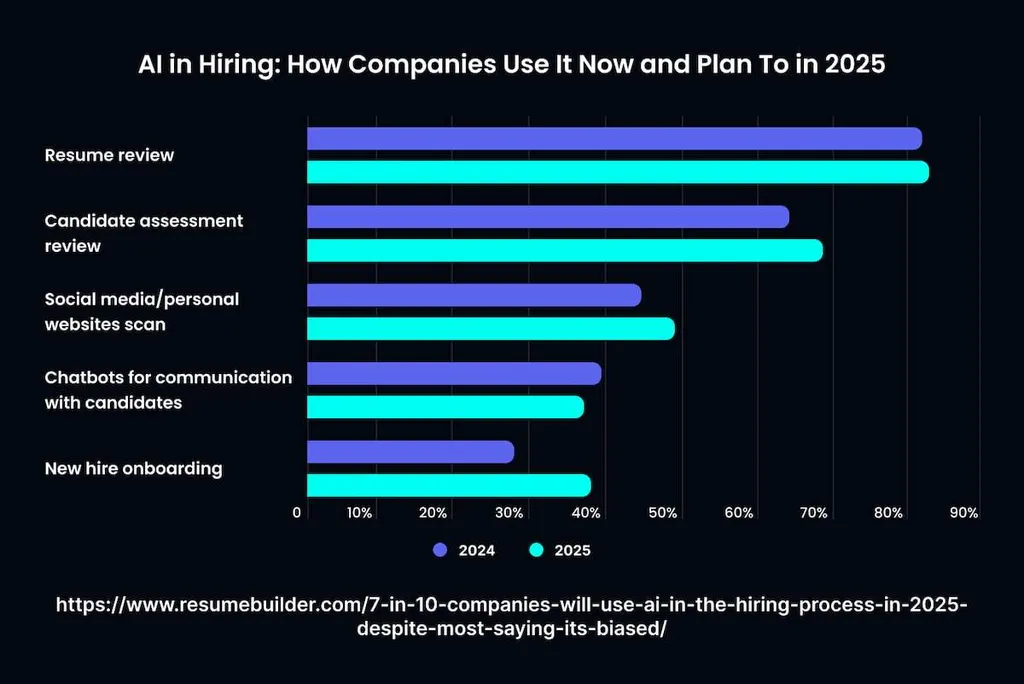The U.S. The Bureau of Labor Statistics reported that there were more than 7.8 million job openings in May 2025. Studying the current market situation, analysts note a steady rise in the time it takes to fill positions, especially in competitive fields. As the labor tendencies change and remote work expands talent pools globally, traditional recruitment methods struggle to keep up. Today, manual screening, inconsistent evaluations, and unconscious bias drain resources and slow growth. AI recruiting tools offer a solution; they help businesses filter CVs, save time on sourcing, and make faster, data-backed hiring decisions. In our guide, we invite you to delve deeper and explore all the nuances of AI recruitment.
Why AI Recruiting Matters in Talent Acquisition?
AI recruiting is one of the use cases of artificial intelligence to automate business workflows. It refers to enhancing various stages of the hiring procedures depending on the goals and scale. These tools are able to do the following:
- Review resumes;
- Screen applicants’ skills;
- Rank candidates based on your requirements;
- Conduct initial interviews using chatbots;
- Assess candidates.

Adding AI in the hiring workflow makes sense for mid-sized and large companies because they need to process thousands of applications or recruit regularly for multiple departments, aiming to lower the time-to-hire rate and improve candidate relevance. In contrast, startups and small firms, working within limited budgets, often prioritize personal involvement in hiring and may not benefit from automated solutions. For them, AI tools are like an unnecessary investment, especially when building teams of 3–4 specialists.
Candidate Sourcing at Scale
Most likely, as a business owner, you have already dealt with the problem of finding the fit-for-role employee and know it is a time-consuming process. However, choosing processes automation, it is possible to scan all available information across job boards, social media, company databases, and professional networks in seconds, instead of reading hundreds of CVs to recruit just one specialist. AI tools autonomously juxtapose keywords, skills, experience, location, availability, and behavior patterns to predict which candidates match your position.
This technology enables recruiters to amplify their productivity, shorten the time to close openings, and improve the overall quality of applications entering the hiring funnel. Imagine a large retail venture hiring seasonal staff. They might inspect thousands of applications in minutes using AI sourcing software. After quick adjustments, the system filters the stream of potential employees depending on current location, availability, and previous experience in sales, and generates a shortlist of applicants to contact. Such an approach expedites hiring during high seasons while ensuring candidates meet the core job requirements.
Specifics of AI-Powered Screening and Shortlisting
When thinking about AI to leverage recruitment, companies have to choose between building an internal system or using a third-party product. Most firms select SaaS platforms, AI-powered applicant tracking systems, recruiting chatbots, or integrated hiring tools within HR software. These options are faster to deploy, more affordable, and have built-in support. However, large entities with complex demands, high staff turnover, or strict data policies may benefit from their own systems that offer full control.
Screening and shortlisting tools use NLP and machine learning algorithms to review profiles. They estimate context, experience, and relevance. Next, they grade applicants depending on how well their qualifications match the job description, mark top candidates, and even anticipate future productivity based on the chronology of past jobs. Some tools also integrate with ATS platforms and other internal software. As an example, a logistics company hiring drivers might use AI to filter for valid licenses, years of experience, and customer service history. The result? You can speed up the initial review phase and be sure no strong candidate slips due to human carelessness.
Virtual Interviews and Pre-Assessment
It is worth mentioning that AI is no longer limited to sourcing and screening, as it allows you to conduct virtual interviews and pre-assessments. Potential employees may complete online tests or virtual interviews, and AI will evaluate their responses based on role-specific benchmarks. This includes analyzing the following parameters:
- Language
- Tone
- Problem-solving approach
- Overall performance
While AI handles the evaluation, the employer can write interview questions themselves. Modern platforms offer ready-to-use templates, but recruiters can ask the questions they need. Some solutions also include AI-generated query suggestions made from the job description, which hiring managers can edit or use without changes.

Enriching Applicant Experience with AI
Artificial intelligence is often associated with automation and speed, but if you look broadly, you will notice it also makes a highly engaging experience for applicants. From the first interaction to the final decision, intelligent systems can create a more responsive hiring journey.
- AI chatbots and virtual assistants help keep candidates informed by answering questions and providing updates about their application status. This lowers the uncertainty often present in traditional hiring and helps applicants feel valued and supported.
- Scheduling tools allow potential employees to choose interview times that suit them, minimizing unnecessary delays and back-and-forth communication.
- A more transparent and personalized process contributes to the employer’s reputation and increases the likelihood of attracting and retaining top talent.
When you use large language models for HR, they can tailor content such as company culture videos, employee testimonials, or role-specific FAQs thanks to data from resumes, application history, or interactions with the company’s career site. This assists candidates better understand the organization and visualize themselves in the role, building engagement and trust before the first interview begins.
Evaluating the Efficiency of the AI Recruiting
According to statistics, AI-powered hiring tools cut recruitment costs by up to 30% and time-to-hire by an average of 50%. While the benefits are clear, it is important to evaluate where AI shines and where traditional methods still hold value.
| Criteria | Traditional Hiring | AI-Powered Recruiting |
| Speed | Slower due to manual work | Much faster thanks to automation and instant data processing |
| Cost-efficiency | Has higher operational costs over time | Reduces long-term expenditures by streamlining repetitive tasks |
| Candidate Quality | Evaluation relies on recruiter intuition and experience | Totally data-based, thanks to using patterns and screening algorithms to get more consistent results |
| Scalability | Limited by human bandwidth | Scales easily to expand hiring |
| Personalization | Stronger human connection and deeper personal understanding | May lack personal warmth and nuanced judgment |
| Complex Role Matching | Recruiters can use qualitative insights for unique or hybrid roles | Struggles with roles that require subjective judgment or soft skills |
| Analytics & Insights | Limited real-time tracking and reporting | Offers real-time dashboards and data-based hiring trends |
As you can see from this table, AI recruiting obviously elevates scalability, but traditional methods are still critical in relationship-building and complex evaluations. Consequently, the most working hiring strategies often combine AI to handle massive data and human expertise for strategic decisions and candidate motivation.
Time-Tested Practices for Bringing AI into Your Talent Acquisition Workflow
To make implementation stress-free and more effective, keep these tips in mind:
- Don’t rush to change the system from day one. Launch your chosen HR AI tools just for one process, whether it is resume screening, or only scheduling interviews, to test compatibility with your existing workflow and assess ROI before global changes.
- Don’t look at the experience of others. A high-volume retailer may benefit from automation at scale, while a mid-size law firm might need more customized functions. Select platforms with features matching your typical hiring volume and industry-specific needs.
- Make sure the AI solution can easily integrate with your current ATS (Applicant Tracking System), CRM, or HRMS. Seamless data flow prevents duplication, errors, and wasted time.
- AI recruiting tools often work with sensitive candidate data. Find service providers that comply with GDPR, local labor laws, and any other applicable regulations. Always be fair with candidates about how their data is used.
- After pilot release, measure key performance indicators (time-to-hire, candidate drop-off rates, and satisfaction scores). Use these insights to fine-tune your recruitment process and update the settings if needed.
We emphasize, AI doesn’t replace recruiters but it supports them. So it is crucial to provide training to your hiring managers to understand how the tool works and makes decisions, and how to interpret and apply AI-generated recommendations responsibly.
The Future of AI-Powered Recruiting
In the next few years, we can see a broader adoption of predictive analytics, where AI anticipates applicants’ possible success more accurately based on behavioral patterns and previous job performance. Developers are now working on perfecting NLP and sentiment analysis, which will continue improving chatbots and HR agents and create more engaging candidate experiences. It is anticipated that AI recruiting tools will become more integrated with broader workforce planning to help recruiters fill vacancies and form long-term talent strategies.
If you’re planning to modernize your customer support workflows and achieve better results without staff overhead, MetaDialog offers powerful conversational AI tools that allow you to automate client responses, amplify satisfaction, and optimize support costs. When combined with AI in recruitment, these solutions contribute to a fully modernized business that is people-centered and tech-driven.
